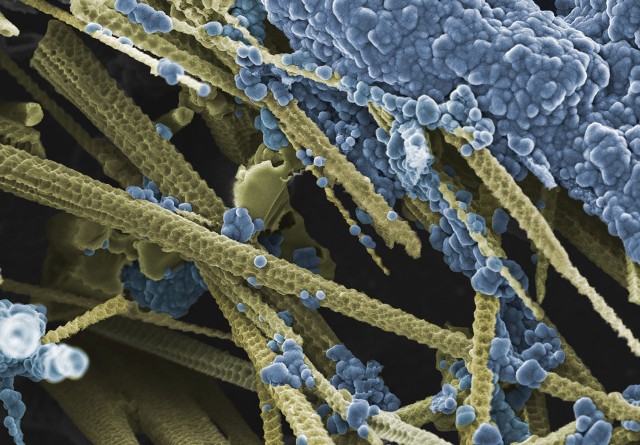Aug 11 2015
A team of researchers from Penn State are working along with Rice University in Houston to design and create innovative 2D coatings capable of solving basic scientific and technological challenges such as oxidation, corrosion, abrasion, energy storage and harvesting, friction and wear and the substantial production and deposition of new coatings with multiple functions.
 Image of an atomically thin coating. (Image: M. Breshnehan)
Image of an atomically thin coating. (Image: M. Breshnehan)
This research endeavour to create atomically thin coatings has been funded by the National Science Foundation (NSF) and will be part of the Industry/University Collaborative Research Center (I/UCRC) program.
2D nanoscale coating materials possess exceptional properties, which can find use in numerous applications such as in automotive, civil infrastructure, glass and polymer manufacturing, electronics, and marine antifouling and anticorrosion coatings. The Center for Atomically Thin Multifunctional Coatings (ATOMIC) will assist in combining world-class research faculty at Penn State and Rice with national laboratories and top industrial partners.
Leading the ATOMIC center for Penn State are Mauricio Terrones, professor of physics, professor of chemistry and professor of materials science and engineering, and Joshua Robinson, assistant professor of materials science and engineering and Corning Faculty Fellow. Jun Lou and Pulickel M. Ajayan, both professors of materials science and nanoengineering, are leading the ATOMIC center at Rice University.
The focus of an I/UCRC is industry driven research, which is part of our new mission at Penn State. Ten companies have committed to support us, and we are excited about establishing new partnerships with other companies interested in coatings.
Joshua Robinson - Assistant Professor of Materials Science & Engineering & Corning Faculty Fellow
Robinson added that since their research is quite a novel area, members are more likely to benefit from the important intellectual property.
"In the future, we expect to create spin-out companies from our center," said Terrones. "Coatings are everywhere. If we can solve the problem of corrosion, that will save society billions of dollars. If we can create multifunctional coatings that produce energy, that will be huge."
The aim of the NSF I/UCRC program is to promote U.S. innovation capacity by seed funding long-term partnerships among universities, government and the industry. The members pool their funds to perform pre-competitive research which offers solutions to basic issues, thereby assisting in the progress of the whole industry sector.
The program enables companies and researchers to form partnerships, and offers students real-world experience and opportunities for employment. NSF provides the necessary organizational structure along with funding for the center’s administration, which can amount to more than $1 million over five years between the two sites. The center’s research funding is procured from member companies.
"My heartiest congratulations to Mauricio, Josh and their colleagues at Rice University," said Neil Sharkey, Penn State's vice president for research. "The Center for Atomically Thin Multifunctional Coatings is just the type of industry-university research partnership that we hope to accelerate here at Penn State. We are very proud to be hosting this new center and anticipate seeing highly innovative materials and coatings that will eventually hit the marketplace in any number of useful applications. The Center, surrounded by highly advanced instrumentation and expertise within Penn State's Materials Research Institute and bolstered by the creativity of its industrial partners, promises to be a wonderful resource for our students and faculty, and one with real potential to impact the economy of the commonwealth and the nation."